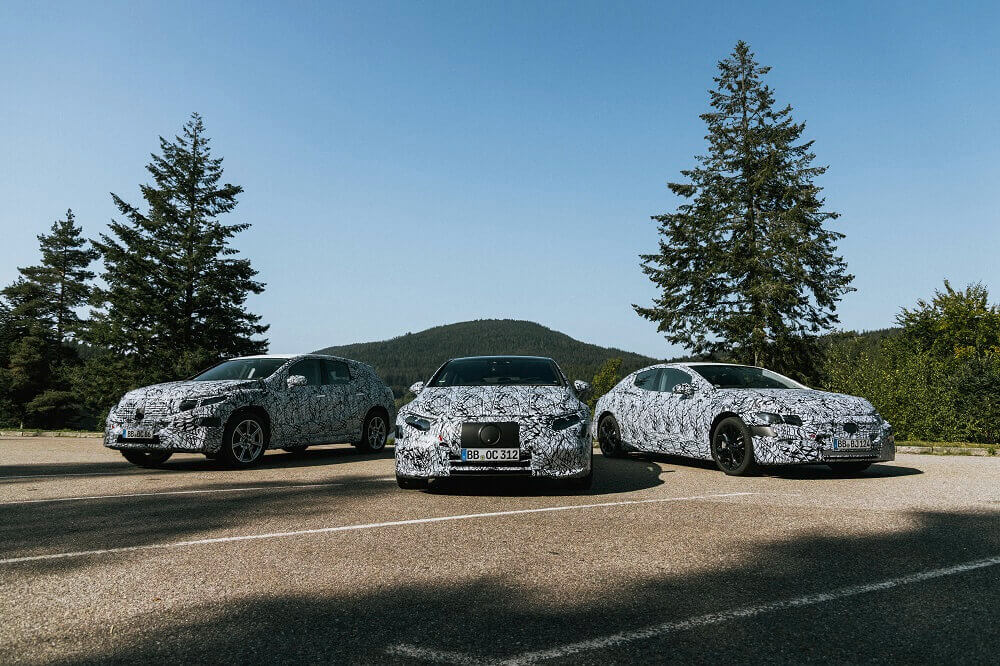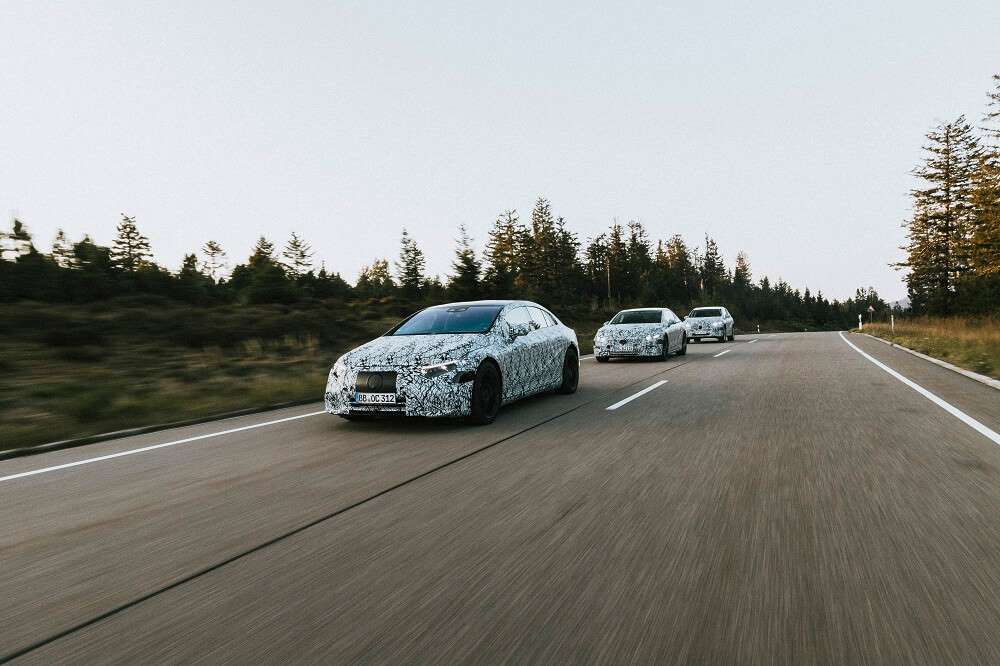Luxury Benz goes electric

Like many car makers Mercedes-Benz was caught napping by the early success of electric vehicle start-up Tesla, which stole a march on rivals by quickly positioning itself as the EV of choice for a new generation of luxury car buyers.
Now, established luxury brands including Mercedes-Benz, BMW and Audi are fighting back with a deluge of all-electric models due to hit the market in the next few years.
In the case of Mercedes-Benz that means an all-electric version of its flagship S-Class sedan, dubbed the EQS, which is due to launch internationally next year and in Australia early in the second quarter of 2021.
The company has already launched internal-combustion powered versions of the next generation S-Class in European markets, with mild and plug-in and hybrid versions set to follow. The first Australian deliveries will be the six-cylinder petrol-powered S 450.
But it is the move to all-electric power in the form of the new EQS that is perhaps the most anticipated development in the evolution of the world’s best-selling luxury saloon, which traces its lineage back to the W116 launched in 1972.
The EQS will be the first model to use Benz’s new electric vehicle architecture, which has been developed especially for its luxury and executive segment models. Other models to follow the EQS and based on the same architecture include the EQE business saloon or sedan, and SUV variants of both the EQS and EQE.
These all-electric models will be followed by the compact EQA, the fully electric sibling of the GLA, which is due to start production later this year, followed by the EQB in 2021. Together that’s six new all-electric models set to join Mercedes existing line-up, which currently comprises only the mid-size EQC 400 SUV in this market, but which elsewhere also includes the EQV people mover.

Mercedes-Benz says the all-new EQS and EQE, and their SUV equivalents will all be based on a custom-developed architecture, which is scalable and can be used across different model series. The company says the wheelbase and track as well as all other system components, especially the batteries, are variable thanks to the modular design.
The electric vehicles also use other technologies from the broader Mercedes-Benz range, including the MBUX (Mercedes-Benz User Experience) control and display system and a range of other driving assistance systems.
The EQS boats a healthy range of up to 700km (according to WLTP), with the camouflaged prototypes seen here offering a glimpse of the new models’ styling, including the cab forward design and coupe-like roofline.
A statement from Mercedes-Benz said the EQS was undergoing final testing ahead of going into production.
As part of the car’s development, camouflaged mules have been validated in icy conditions in the Scandinavian winter, in the warmer climes of southern Europe and South Africa, and on the high-speed test track at Italy’s Nardo circuit.
Test drives are currently also being conducted in China and the USA, according to Mercedes, with particular focus on the durability and performance of the electric powertrain and the battery.
“The EQS has already piled up far more than two million test kilometres from the heat of South Africa to the cold of northern Sweden," said Christoph Starzynski, Vice-President Electric Vehicle Architecture at Mercedes-Benz and responsible for the EQ vehicles.
"The EQS will be the S-Class of electric vehicles. That is why it is undergoing the same demanding development program as any other vehicle that has the privilege of proudly bearing the three-pointed star.
“In addition, there were quite a few tests specifically for electric cars that cover important development priorities such as range, charging and efficiency."
As part of its “Ambition 2039” initiative, Mercedes-Benz is working on offering a CO2-neutral new car fleet in less than 20 years’ time. The company wants electrically powered cars including all-electric and plug-in hybrid vehicles to account for more than half of its sales by 2030.
Related topics
Things to note
The information in this article has been prepared for general information purposes only and is not intended as legal advice or specific advice to any particular person. Any advice contained in the document is general advice, not intended as legal advice or professional advice and does not take into account any person’s particular circumstances. Before acting on anything based on this advice you should consider its appropriateness to you, having regard to your objectives and needs.
Insurance Products (excluding Travel Insurance) are issued by RACQ Insurance Limited ABN 50 009 704 152 (RACQI) and arranged by RACQ Distribution Services Pty Ltd (RDS) ABN 35 116 361 650, AFSL 567130 and RDS' authorised representatives (including RACQ Operations Pty Ltd ABN 80 009 663 414, AR No. 234978 (RACQO)). Conditions, limits and exclusions apply.
Any advice provided by RDS and RACQO is general advice only and does not take into account your personal objectives, financial situation or needs and you will need to consider whether the advice is appropriate for you. Read the Product Disclosure Statement (PDS) before making a purchase decision on the product. You can also access our Target Market Determinations on this website.
RDS receives a commission from RACQI for the policies it arranges. RACQO receives fees paid for services it provides to RDS. Further details about remuneration are available on request prior to purchasing.
Banking and loan products issued by Members Banking Group Limited ABN 83 087 651 054 AFSL/Australian credit licence 241195 trading as RACQ Bank. Terms, conditions, fees, charges and lending policies apply. This is general advice only and may not be right for you. This information does not take your personal objectives, circumstances or needs into account. Read the disclosure documents for your selected product or service, including the Financial Services Guide and the Terms and Conditions, and consider if appropriate for you before deciding.
Except for RACQ Bank, any RACQ entity referred to on this page is not an authorised deposit-taking institution for the purposes of the Banking Act 1959 (Cth). That entity’s obligations do not represent deposits or other liabilities of RACQ Bank. RACQ Bank does not guarantee or otherwise provide assurance in respect of the obligations of that entity, unless noted otherwise.
RACQ Bank subscribes to the Customer Owned Banking Code of Practice which establishes higher standards than the law requires. The Code reflects modern consumer expectations and developments in approaches to issues such as consumer vulnerability, guarantors, and supporting customers through financial hardship. Please read our Customer Owned Banking Code of Practice page for more information.
RACQ Operations Pty Ltd (ABN 80 009 663 414 AR 000234978) and Members Travel Group Pty Ltd (ABN 45 144 538 803 AR 000432492) are acting as an Authorised Representative of the issuer of the insurance, Tokio Marine & Nichido Fire Insurance Co., Ltd. (ABN 80 000 438 291 AFSL 246 548). Any advice set out above is general in nature only, and does not take into account your objectives, financial situation or needs. Before purchasing any travel products, please consider the RACQ Travel Insurance Product Disclosure Statement (PDS) and the Target Market Determinations (TMDs) that apply to these products. Whilst the PDS outlines the Terms and Conditions of these products, the TMDs outline the intended class of customers that comprise the target market for these travel products. This will allow you to consider which products best suit your objectives, financial situation and needs and consider the products appropriateness to your personal circumstances. TMDs also outline matters involving the distribution and the review of these products. The PDS, Supplementary PDS and TMDs for each travel product can be found here.

